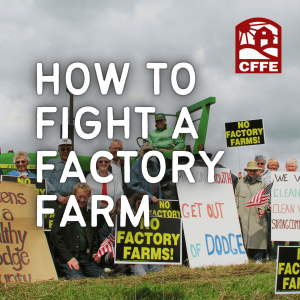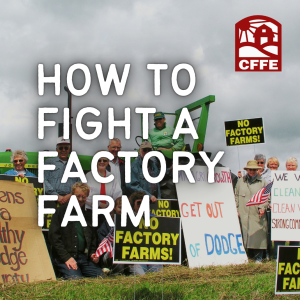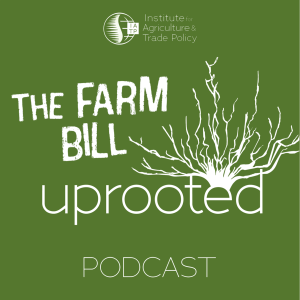How to Fight a Factory Farm
A concentrated animal feeding operation, or CAFO – better known as a factory farm – is a facility where large numbers of animals are raised in confined, cramped conditions. A few decades ago, CAFOs were very uncommon. Today, the vast majority of farm animals in the U.S. are raised in CAFOs. Over the course of this four-part series, we’ll learn about how factory farms took over the American agriculture system, what effect they’ve had on rural communities in the Midwest, and we’ll meet some of the farmers, advocates and rural organizers fighting against them as part of the Campaign for Family Farms and the Environment. How to Fight a Factory Farm is produced by the Institute for Agriculture and Trade Policy, a member of the Campaign for Family Farms and the Environment. This feed also includes IATP’s two previous podcast series, Uprooted: Talking COP27 and The Farm Bill Uprooted.
Episodes

Wednesday Oct 23, 2024
Wednesday Oct 23, 2024
The rise of factory farms in the U.S. didn't happen by accident. Corporate influence over our political system has created policies that subsidize and incentivize the industrial model and allow factory farms to pollute with impunity, even creating new revenue streams that greenwash their climate impacts. Our food system does not have to be this way. Members of the Campaign for Family Farms and the Environment are working to build sustainable alternatives to factory farms while advocating for policy reforms to dismantle the CAFO system and level the playing field for independent family farmers.
In the final episode of the series, hear from Frank James of Dakota Rural Action, Rebecca Wolf of Food and Water Watch, Bonnie Haugen of Land Stewardship Project and Noah Earle of Missouri Rural Crisis Center on how we got into this mess, and how to get out of it.
How to Fight a Factory Farm is produced by the Institute for Agriculture and Trade Policy, a member of the Campaign for Family Farms and the Environment. Thank you to our intern, Anna Karns, for her assistance producing this series, and to Noah Earle for the use of his song “Fry an Egg” for our theme music. Learn more about the Campaign for Family Farms and the Environment at fightfactoryfarms.org.
References, further reading and ways to get involved
Support the Farm System Reform Act
Packers and Stockyards Act In-Depth, Bryce Oates, 2024
Why we need an Agricultural Market Volatility Relief Program, CFFE, 2023
Biogas or Bull****? Friends of the Earth & Socially Responsible Agriculture Project, 2024

Wednesday Oct 16, 2024
Wednesday Oct 16, 2024
Despite the well-documented harms to the environment and rural economies, the CAFO system continues to expand. But its growth is not inevitable. In South Dakota, Iowa and all across factory farm country, everyday people are stepping up and organizing their neighbors to prevent factory farms from being built in their communities. How to fight a factory farm? People power.
In this episode, hear from Vanessa Namken and Frank James of Dakota Rural Action and Barb Kalbach and Hugh Espey of Iowa CCI on how they successfully stopped CAFOs from being built near their homes.
How to Fight a Factory Farm is produced by the Institute for Agriculture and Trade Policy, a member of the Campaign for Family Farms and the Environment. Thank you to our intern, Anna Karns, for her assistance producing this series, and to Noah Earle for the use of his song “Fry an Egg” for our theme music. Learn more about the Campaign for Family Farms and the Environment at fightfactoryfarms.org.
References and further reading
"13 Groups Sued EPA Demanding Stricter CAFO Regulation — the Court Struck Them Down." Sentient Media, October 2024.
Pounds of manure produced by dairy cows: University of Wisconsin School of Veterinary Medicine
"A mega-dairy is transforming Arizona’s aquifer and farming lifestyles." High Country News, August 2021

Wednesday Oct 09, 2024
Wednesday Oct 09, 2024
What does it mean to get big or get out? As CAFOs began to take over livestock production in the U.S. through the 1990s, the consequences of this corporate-controlled, vertically-integrated system rippled throughout rural economies, putting smaller independent farmers and their suppliers out of business, and trapping others in debt and dependence on exploitative meat companies. In this episode, hear from Missouri Rural Crisis Center’s Rhonda Perry and Tim Gibbons and Iowa CCI’s Barb Kalbach and Hugh Espey on the price we pay for factory farms.
How to Fight a Factory Farm is produced by the Institute for Agriculture and Trade Policy, a member of the Campaign for Family Farms and the Environment. Thank you to our intern, Anna Karns, for her assistance producing this series, and to Noah Earle for the use of his song “Fry an Egg” for our theme music. Learn more about the Campaign for Family Farms and the Environment at fightfactoryfarms.org.

Wednesday Oct 02, 2024
Wednesday Oct 02, 2024
What is a concentrated animal feeding operation (CAFO), and what does it mean that nearly all farm animals in the U.S. are now raised in them? Factory farms are a major change from how livestock was traditionally raised, and the billions of gallons of manure produced by these facilities are causing major problems for neighbors, the environment and anyone downstream. Independent family farmers and rural communities are facing the brunt of these consequences, but they're not going to take it lying down.
In this episode, hear from Rebecca Wolf, Senior Food Policy Analyst at Food and Water Watch, along with Iowa CCI's Barb Kalbach and Dakota Rural Action's Kathy Tyler on the pollution crisis created by factory farms, and what it means for those living nearby.
References and further reading
The CAFO Next Door, REAMP Network, June 2024
Factory Farm Nation: 2024 Edition, Food and Water Watch
Barons: Money, Power, and the Corruption of America's Food Industry, Austin Frerick, 2024
US Factory Farming Estimates, Sentience Institute, 2019
Environmental Regulation of Hog Feeding Operations, Chen, C.-T. and G. Lade, Iowa State University, 2018
Animal Feeding Operations (AFOs), EPA, 2024
How to Fight a Factory Farm is produced by the Institute for Agriculture and Trade Policy, a member of the Campaign for Family Farms and the Environment. Thank you to our intern, Anna Karns, for her assistance producing this series, and to Noah Earle for the use of his song “Fry an Egg” for our theme music. Learn more about the Campaign for Family Farms and the Environment at fightfactoryfarms.org.

Wednesday Sep 18, 2024
Wednesday Sep 18, 2024
Coming October 2 from the Campaign for Family Farms and the Environment, a new four-part podcast series about factory farms, and the farmers and rural organizers fighting to end them: How to Fight a Factory Farm.
How to Fight a Factory Farm is produced by the Institute for Agriculture and Trade Policy, a member of the Campaign for Family Farms and the Environment. Thank you to our intern, Anna Karns, for her assistance producing this series, and to Noah Earle for the use of his song “Fry an Egg” for our theme music. Learn more about the Campaign for Family Farms and the Environment at fightfactoryfarms.org.

Tuesday Jun 04, 2024
Tuesday Jun 04, 2024
Eight months after the original deadline, there’s been some movement on the new Farm Bill – but political conflicts and agribusiness influence present a challenge. Learn about how the policy process works and hear from IATP’s Michael Happ and Ben Lilliston about the House Farm Bill draft and what comes next.

Wednesday Sep 20, 2023
Wednesday Sep 20, 2023
In Episode Six of the Farm Bill Uprooted, hear from experts from across the food system on what changes are needed in the 2023 Farm Bill and beyond. From nutrition access to fair markets to climate resilience, a better food system is possible; it’s up to us to demand it.
References and Further Reading:
Closing the Meal Gap Act
Improving Access to Nutrition Act
Enhanced Access to SNAP Act
Hot Foods Act
Meat Packing Special Investigator Act
Farm System Reform Act
Fairness for Small Farmers Act
EQIP Improvement Act
Agriculture Resilience Act
RAFI-USA Marker Bill Tracker
Why we need an Agricultural Market Volatility Relief Program

Wednesday Sep 06, 2023
Wednesday Sep 06, 2023
The Farm Bill shapes our food and farm system in the U.S., and, through the Nutrition Title, helps millions of Americans afford food. But with nutrition assistance programs like SNAP vulnerable to cuts, and rural food access weakened by decades of corporate consolidation, how well is the Farm Bill really serving eaters? In Episode Five of the Farm Bill Uprooted, hear from IATP's Erin McKee VanSlooten, Kate Hansen of the Center for Rural Affairs and Marcus Grignon of the Rural Coalition, on what's needed to rebuild community-based food systems and create a Farm Bill that's by and for the people.
References and Further Reading:
Food Research and Action Center (FRAC) Farm Bill priorities
Food Price Outlook, 2023 and 2024, (2023) USDA Economic Research Center
A Short History of SNAP, USDA
A Quick Guide to SNAP Eligibility and Benefits, (2023) Center on Budget & Policy Priorities
Minnesota Department of Agriculture Farm to School Grant Evaluation, (2023) IATP & UMN

Wednesday Aug 23, 2023
Wednesday Aug 23, 2023
Over the past few decades, the landscape of the food and farm system has become more concentrated, less diverse and less resilient. In Episode Four of the Farm Bill Uprooted, hear from Campaign for Family Farms and the Environment’s (CFFE) Patty Lovera and Iowa Interfaith Power and Light’s (IIPL) Elston Tortuga about how corporate consolidation in the food system has impacted farmers and rural communities, and how Farm Bill reforms can help.

Wednesday Aug 09, 2023
Wednesday Aug 09, 2023
How does credit access shape our food and agriculture system? In Episode Three of the Farm Bill Uprooted, hear from IATP’s Dr. Steve Suppan, along with Margaret Krome-Lukens and Ray Jeffers of RAFI-USA, about how the Farm Bill Credit Title both undermines climate resilience by propping up the industrial model of production and reinforces a history of racism in American agriculture.
Learn more about RAFI-USA, NFFC and the Fair Credit for Farmers Act.







